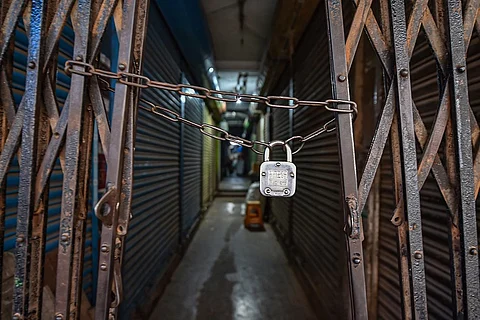

Murugesan, a plumber from Chennai, is worried sick. He hasn’t gotten any work for weeks now. The sole bread-earner for a family of eight, he is now struggling to manage with even basic groceries.
“We are rationing and dividing whatever we have into proportions and managing so far. I have two daughters in college. I have not paid the fees yet and don't know how I will do so if I don't find work. For now, we are waiting for information from the state government and hoping that we will get some concession,” Murugesan told TNM.
The coronavirus pandemic and the subsequent lockdown to curb its spread has taken a major toll on companies, both large and small. From airlines and restaurants, from automobile makers to tech companies, nearly every industry is staring at massive losses due to the pandemic. This has gotten people worried about their job security and income. Daily wage earners are among the worst hit, with several factories and construction sites closing down.
Offering some respite and hope, several companies have promised not to lay off employees, while some have assured regular salaries. The government too has announced a series of measures in an attempt to protect the poor and those below the poverty line from suffering.
But between all these people is a tiny sliver that has fallen through the cracks: Small entrepreneurs, most of who are self-employed individuals.
From carpenters and beauticians to small store owners and freelancers, there are a large number of those running their own business. But with the lockdown, their income has come to a grinding halt.
Many of these businesses have been forced to shut shop amid the lockdown as they don’t classify as an essential service. Yet, they are entirely dependent on income from their work for their daily bread.
And not just Murugesan. Same is the case with Ashok, who has a small eatery in Hyderabad where he sells snacks and chaat. “I have to pay the shop’s rent, house rent, kids fees and even manage household expenses. Everything was dependent on the money we made at the shop. We’re really worried, but we don’t have an option but to wait,” Ashok adds.
These small business owners don’t classify as poor since many of them earn an income of around Rs 25,000-30,000 a month. And while they might be their own bosses, this income doesn’t cushion them from uncertainties such as the current pandemic. And even as the government announces measures for corporates, MSMEs and the poor, this lot that lies in the blur between the formal and informal sector, goes unnoticed.
“I saw that the government is announcing some measures for the poor. But I don’t know if I qualify for that. I made about Rs 25,000 a month through clients and so far, we would manage somehow. But now that has become zero. I don’t know when I’ll get the next client. I have very little savings, but that isn’t enough for bills, rent, daily expenses put together,” says Pooja, a makeup artist and a single mother to a daughter, who has been running the household with money earned through clients.
Not just the government, the Reserve Bank of India too, announced a slew of measures such as a three-month moratorium on EMIs. But for most of these small business owners, that still means nothing. This is because many like Chary, a carpenter from Hyderabad, have borrowed money from loan sharks, or have invested in local finance collectives such as chit funds.
Chary, who borrowed Rs 1 lakh for his son’s education from a local moneylender, says he will not be given any respite.
“If I don’t pay him back now, he will increase the interest. Later to pay back that bigger amount, it’s even more difficult. Paying through my nose now is better than accumulating it,” Chary says.
Several of these people are also hugely dependent on other businesses and industries for their business to thrive. Chary says that hardware shops and plywood depots are all likely to incur huge losses, and if those industries are hit, Chary’s work will also take a beating.
Similarly, Ahmed, who runs a grocery store along the highway in Kamareddy in Telangana saw a bulk of his sale coming from restaurants and truck drivers who bought oil, rice and other essentials in large quantities. Now with restaurants shut, and interstate movement curbed, Ahmed has lost that chunk of business.
“Usually restaurants would buy easily 10 oil packets per day from me. Now all are shut. I even used to sell to lorry drivers who stopped by. We are a family of five, depending on income from the store. If the business remains low like this, I’m not sure how we will sustain. Even if I want to think of moving elsewhere for opportunities, that can’t happen now,” Ahmed says.
Even as they wait for work to resume once the lockdown ends, some of them are hoping the government offers some relief to the self-employed. While some of them own white ration cards and are able to procure basic grocery and income support from state governments, some do not qualify for the relief and are struggling to make ends meet.